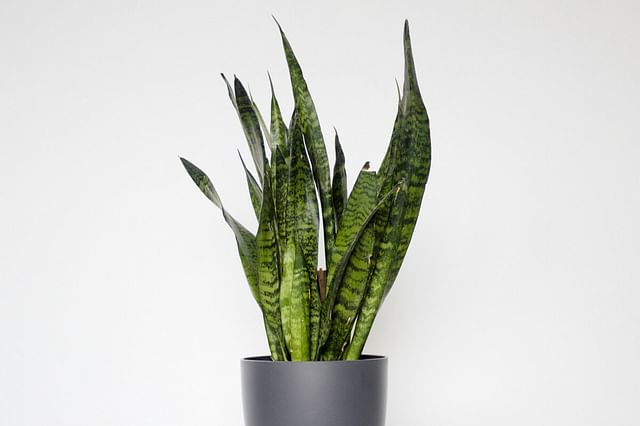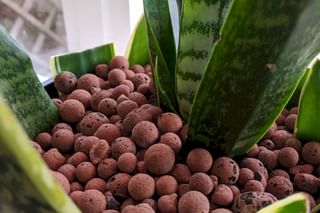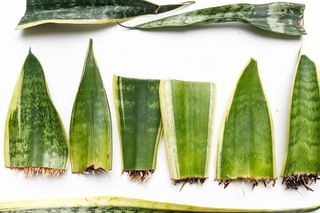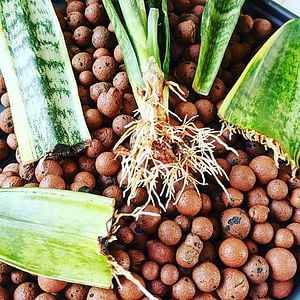The ultimate guide for Sansevieria plant care

Sansevierias are very unusual looking plants, with blades instead of leaves. They're perfect plants for beginning plant owners that forget about their plants all the time. This plant will survive any light exposure you have in your house and will be a plant friend for years to come.
To give you the best chance to take care of this plant, I've broken down the caring process into a few different steps. These steps give you the most in-depth information to teach you everything you need to know about caring for your plant.
-
The 10 best low-light houseplants for beginners
-
How to care for Sansevierias
-
How to grow Sansevierias in Leca
-
How to propagate a Sansevieria (Snake plant)
1
. The 10 best low-light houseplants for beginners
Back to the top
Low-light plants are amazing plants that don't require as much sunlight exposure as other plants, while they can still thrive. Low-light plants, however, are often overlooked as being low-light plants. Especially as a beginner, others will tell you that plants need sunlight to grow. In this post, we're going to highlight 5 beginner-friendly and low-light loving plants.
Read "The 10 best low-light houseplants for beginners"
2
. How to care for Sansevierias
Back to the top
One of the easiest types of plant for beginners is a plant in the Sansevieria family. They require very little attention, they purify the air in your house and they look amazing. In this guide, we'll go over everything you need to know when you're taking care of a Sansevieria.
Read "How to care for Sansevierias"
3
. How to grow Sansevierias in Leca
Back to the top
In this guide, we show you step by step how to prepare your pots, your plant, and your Leca. Then we'll show you how to plant it in Leca and how to water your plant from now on.
Read "How to grow Sansevierias in Leca"
4
. How to propagate a Sansevieria (Snake plant)
Back to the top
In this plant care guide, we're going to look at how you can propagate your Sansevieria (Snake plant) and give it the best chance to help it grow into an adult plant. We're going to look at different ways to propagate and different growing mediums to help you achieve success.
Read "How to propagate a Sansevieria (Snake plant)"
In this ultimate guide to taking care of a Sansevieria, we've split the entire process into smaller chunks, so you don't get overwhelmed with information. Each of these guides can be used separately and will become useful in different stages of your caring process.
Scientific classification of Sansevieria trifasciata
Plants go by many names, but it can become confusing very quickly if you're talking about different plants with the same nickname. That's why I'm including the scientific name of the plant, so we're all on the same page!
|
Classification
|
Name
|
|
Species
|
Sansevieria trifasciata |
Frequently asked questions
How should you water the Sansevieria?
The Sansevieria likes to grow in a dry environment and should only be watered when the soil is completely dry.
How much sunlight does the Sansevieria need?
The Sansevieria prefers a darker spot of your house: a spot where it gets low-light sunlight exposure. Your Sansevieria doesn't like too much light.
How much fertilizer does the Sansevieria need?
The Sansevieria doesn't need to be fertilized to stay healthy. You can help it grow a little more quickly by fertilizing it once at the beginning of spring and summer.
What is the best soil for the Sansevieria?
The Sansevieria prefers a dry growing environment, so you should use well-draining soil to keep your Sansevieria happy!
What is the ideal temperature for the Sansevieria?
The Sansevieria prefers a spot that consistently stays between 12 - 29°C (53 - 84°F).
How do you propagate the Sansevieria?
To propagate the Sansevieria, you can take cuttings from the parent plant. Often, you cut part of the stem of the Sansevieria and plant that in moist soil.
How often should you repot the Sansevieria?
You should repot your Sansevieria once every 2 year(s). This helps your Sansevieria to stay healthy for many years.
Is the Sansevieria easy to take care of?
The Sansevieria is easy to take care of and great for beginners.
Didn't find what you were looking for?
We have resources about other plants and plant-related topics as well.
Perhaps these resources contain the information you're looking for.
I've written a lot of guides about all kinds of aspects of taking care of plants, but I could've missed that specific topic you were looking for. If that's the case, you can request a plant guide. This way I can provide you with the information you need quickly and you won't have to wonder if you're taking care of your plant properly anymore.




